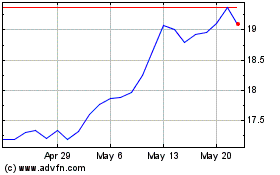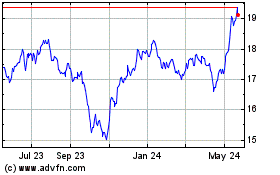Form N-CEN - Annual Report for Registered Investment Companies
15 December 2023 - 4:51AM
Edgar (US Regulatory)
Item G.1.b.iv. Information called for by Item 405 of
Regulation S-K:
Delinquent
Section 16(a) Reports
Section 16(a) of
the 1934 Act and Section 30(h) of the 1940 Act, as applied to the Fund, require
the Fund's officers and Trustees, certain officers and directors of the
investment advisers, affiliates of the investment advisers, and persons who
beneficially own more than 10% of the Fund's outstanding securities to
electronically file reports of ownership of the Fund's securities and changes in
such ownership with the SEC and the NYSE.
Based solely on
the Fund’s review of such forms filed on EDGAR or written representations from
reporting persons that all reportable transactions were reported, to the
knowledge of the Fund, during the fiscal period ended September 30, 2023, the
Fund’s officers, Trustees and greater than 10% owners timely filed all reports
they were required to file under Section 16(a), except that: Gordon Baird; Chris
LaVitoire Mahai and Thomas Hunersen each filed a late Form 3 filing following
their respective appointments as Trustees of the Fund. Each late Form 3 was due
to an unanticipated delay in obtaining the reporting person’s EDGAR filing
codes, was required solely as a result of such individual becoming a reporting
person of the Fund, and not related to any transactions in Fund shares.
Report of Independent Registered Public Accounting
Firm
To the Shareholders and Board of
Trustees
abrdn Global Infrastructure Income Fund:
In planning and performing our audit
of the consolidated financial statements of abrdn Global Infrastructure Income
Fund (the Fund) as of and for the year ended September 30, 2023, in
accordance with the standards of the Public Company Accounting Oversight Board
(United States), we considered the Fund's internal control over financial reporting,
including controls over safeguarding securities, as a basis for designing our
auditing procedures for the purpose of expressing our opinion on the
consolidated financial statements and to comply with the requirements of Form
N-CEN, but not for the purpose of expressing an opinion on the effectiveness of
the Fund's internal control over financial reporting. Accordingly, we express
no such opinion.
Management of the Fund is responsible
for establishing and maintaining effective internal control over financial reporting.
In fulfilling this responsibility, estimates and judgments by management are
required to assess the expected benefits and related costs of controls. A
company's internal control over financial reporting is a process designed to
provide reasonable assurance regarding the reliability of financial reporting
and the preparation of financial statements for external purposes in accordance
with generally accepted accounting principles. A company's internal control
over financial reporting includes those policies and procedures that (1)
pertain to the maintenance of records that, in reasonable detail, accurately
and fairly reflect the transactions and dispositions of the assets of the
company; (2) provide reasonable assurance that transactions are recorded as
necessary to permit preparation of financial statements in accordance with
generally accepted accounting principles, and that receipts and expenditures of
the company are being made only in accordance with authorizations of management
and directors of the company; and (3) provide reasonable assurance regarding
prevention or timely detection of unauthorized acquisition, use, or disposition
of the company's assets that could have a material effect on the financial
statements.
Because of its inherent limitations,
internal control over financial reporting may not prevent or detect
misstatements. Also, projections of any evaluation of effectiveness to future
periods are subject to the risk that controls may become inadequate because of
changes in conditions, or that the degree of compliance with the policies or
procedures may deteriorate.
A deficiency in internal control over
financial reporting exists when the design or operation of a control does not
allow management or employees, in the normal course of performing their
assigned functions, to prevent or detect misstatements on a timely basis. A
material weakness is a deficiency, or a combination of deficiencies, in
internal control over financial reporting, such that there is a reasonable
possibility that a material misstatement of the company’s annual or interim
financial statements will not be prevented or detected on a timely basis.
Our consideration of the Fund's
internal control over financial reporting was for the limited purpose described
in the first paragraph and would not necessarily disclose all deficiencies in
internal control that might be material weaknesses under standards established
by the Public Company Accounting Oversight Board (United States). However, we
noted no deficiencies in the Fund's internal control over financial reporting
and its operation, including controls over safeguarding securities, that we
consider to be a material weakness as defined above as of
September 30, 2023.
This report is intended solely for the information and use of
the management and the Board of Trustees of abrdn Global Infrastructure Income
Fund and the Securities and Exchange Commission and is not intended to be and
should not be used by anyone other than these specified parties.
Philadelphia,
Pennsylvania
November 29, 2023
abrdn Global Infrastruct... (NYSE:ASGI)
Historical Stock Chart
From Mar 2024 to Apr 2024

abrdn Global Infrastruct... (NYSE:ASGI)
Historical Stock Chart
From Apr 2023 to Apr 2024
